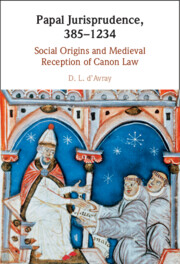Book contents
- Papal Jurisprudence, 385–1234
- Papal Jurisprudence, 385–1234
- Copyright page
- Dedication
- Contents
- Acknowledgements
- Abbreviations
- Sigla
- Introduction
- 1 Transformations and Long-Term Explanations
- 2 The Christian Roman Empire, c. 400
- 3 c. 400: Practical Complexities and Uncertainties
- 4 c. 400: Uncertainty about Grace
- 5 Papal Rulings and Ritual
- 6 Hierarchies
- 7 Clerical Status and Monks
- 8 Returning Heretics
- 9 Pelagianism and the Papacy
- 10 Leo I
- 11 Post-Imperial Syntheses
- 12 Early Papal Laws in the Barbarian West
- 13 Carolingian Culture and Its Legacy
- 14 1050–1150
- 15 Theology and Law
- 16 c. 400 and c. 1200: Complexity, Conversion, and Bigamia
- 17 Clerics in Minor Orders
- 18 Choosing Bishops
- Overall Conclusions
- Book part
- Select Bibliography
- Index
2 - The Christian Roman Empire, c. 400
Published online by Cambridge University Press: 10 March 2022
- Papal Jurisprudence, 385–1234
- Papal Jurisprudence, 385–1234
- Copyright page
- Dedication
- Contents
- Acknowledgements
- Abbreviations
- Sigla
- Introduction
- 1 Transformations and Long-Term Explanations
- 2 The Christian Roman Empire, c. 400
- 3 c. 400: Practical Complexities and Uncertainties
- 4 c. 400: Uncertainty about Grace
- 5 Papal Rulings and Ritual
- 6 Hierarchies
- 7 Clerical Status and Monks
- 8 Returning Heretics
- 9 Pelagianism and the Papacy
- 10 Leo I
- 11 Post-Imperial Syntheses
- 12 Early Papal Laws in the Barbarian West
- 13 Carolingian Culture and Its Legacy
- 14 1050–1150
- 15 Theology and Law
- 16 c. 400 and c. 1200: Complexity, Conversion, and Bigamia
- 17 Clerics in Minor Orders
- 18 Choosing Bishops
- Overall Conclusions
- Book part
- Select Bibliography
- Index
Summary
The focus of the chapter is on those features of the late Roman world in the West which were the environment of early papal jurisprudence. These include: the sheer number of clerics and monks, the heterogeneity of these two Christian elites, their relation to existing secular legislation on status and occupations, inconsistency in ritual systems, contested meanings of baptism and its place in the religious year, the symbolic significance of time, the disruption to society of the barbarian invasions, the two Christian systems of marriage (episcopal and imperial), and the spatial structures of empire and church. The chapter attempts to elucidate two overlapping sources of tension which played a part in generating the first papal jurisprudence: the multiplicity of semi-autonomous evolving systems, and uncertainty about where or whether to draw a line between non-negotiable principles and legitimate variation.
Keywords
- Type
- Chapter
- Information
- Papal Jurisprudence, 385–1234Social Origins and Medieval Reception of Canon Law, pp. 21 - 34Publisher: Cambridge University PressPrint publication year: 2022

